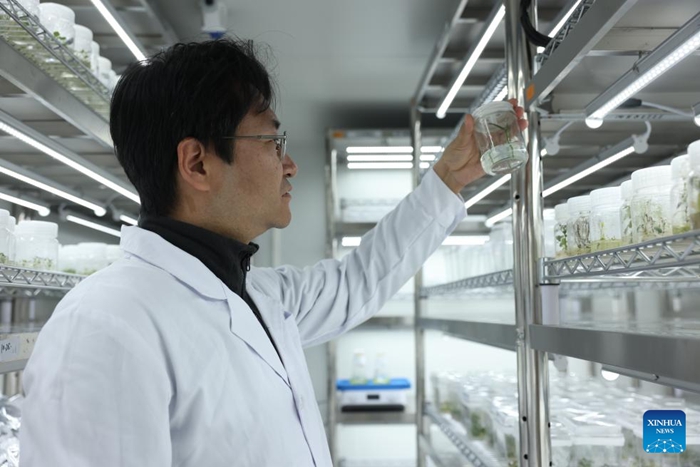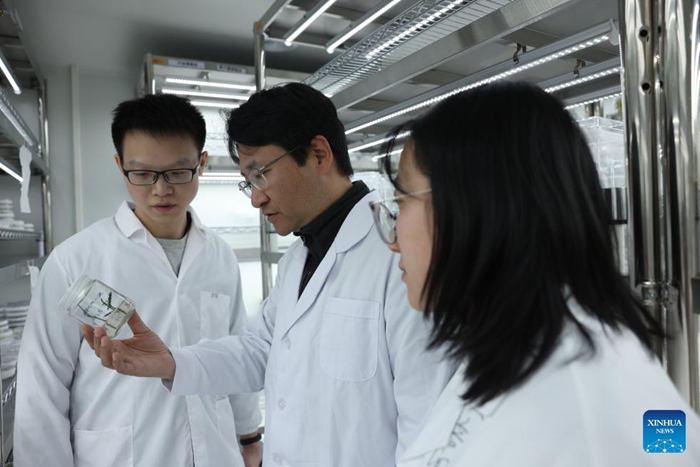[Xinhua] China Focus: Chinese scientists achieve breakthrough in biosynthesis of anticancer drug paclitaxel

Yan Jianbin, a researcher at the Agricultural Genomics Institute at Shenzhen (AGIS) under the Chinese Academy of Agricultural Sciences (CAAS), observes the growth of a Taxus seedling in a lab at the AGIS in Shenzhen, south China's Guangdong Province, Jan. 26, 2024. (AGIS/Handout via Xinhua)
BEIJING, Jan. 26 (Xinhua) -- Chinese scientists have broken through the critical technological bottleneck in the biosynthesis of the anticancer drug paclitaxel, paving the way for sustainable biomanufacturing of this medicine.
The study, led by Yan Jianbin, a researcher at the Agricultural Genomics Institute at Shenzhen (AGIS) under the Chinese Academy of Agricultural Sciences (CAAS), was published in the latest issue of the academic journal Science.
Paclitaxel, a natural anti-tumor product with an exceptionally complex and unique molecular structure, is widely used in the clinical treatment of breast cancer, ovarian cancer, lung cancer, and other cancers. It is the world's best-selling plant-based anticancer drug and one of the few plant-based drugs capable of controlling the growth of cancer cells, said Yan.
In nature, paclitaxel can only be extracted from the rare and endangered gymnosperm of the Taxus genus of plants. A Taxus plant grows very slowly, usually taking decades or even hundreds of years to become a big tree. In addition, the content levels of paclitaxel-like substances in Taxus plants are extremely low. All these factors posed great difficulties for the further utilization of paclitaxel, Yan said.
The research team aimed to tackle the challenge of paclitaxel biosynthesis. In 2021, Yan's group mapped out the first high-quality reference genome of Taxus mairei in the world, which provided a genomic blueprint and key candidate genes for decoding the paclitaxel biosynthesis pathway. The relevant research results were published in the journal Nature Plants.
On this basis, the research team further screened and identified the essential candidate genes and successfully discovered the most critical and previously unknown enzyme in the paclitaxel biosynthesis pathway, elucidating the mechanism of paclitaxel pharmacological structure formation and establishing a paclitaxel biosynthesis pathway.
Additionally, the key enzymes of paclitaxel biosynthesis and the reconstruction method of the synthetic route involved in the research, are of great significance in guiding the genetic breeding of Taxus and the efficient use of germplasm resources, experts said.
The elucidation of the metabolic pathway responsible for the synthesis of paclitaxel had been an unsolved problem for many years. The Chinese research group managed to fill the gaps in the paclitaxel synthesis pathway. Besides constituting a very important contribution to basic science, this development is also significant for opening the way for the more effective and cheaper synthesis of the taxol drug, as well as for the new ability to synthesize many derivatives in search of more potent anticancer drugs, said Gregory Stephanopoulos, a professor at the Massachusetts Institute of Technology in the United States.
"This finding is a major breakthrough in our understanding of the biosynthesis of complex natural products, and it will enable our abilities to produce other valuable natural products at scale and thereby develop new and valuable medicines," said Jens Nielsen, a professor at the Chalmers University of Technology in Sweden.
The research team found a green and sustainable paclitaxel production method that does not require the consumption of natural Taxus resources. Developing a green and environmentally friendly strategy for the biosynthesis of paclitaxel is of great significance for treating cancers in China, said Deng Zixin, an academician of the Chinese Academy of Sciences (CAS).
"Chinese scientists have reached a new milestone in the field of synthetic biology after two decades of exploration. I believe that as long as we continue to focus on relevant research, we will gain a new understanding of the essence of life and new prospects for synthetic biomanufacturing," said Zhao Guoping, a CAS academician.

Yan Jianbin (2nd L), a researcher at the Agricultural Genomics Institute at Shenzhen (AGIS) under the Chinese Academy of Agricultural Sciences (CAAS), and team members observe the growth of a Taxus seedling in a lab at the AGIS in Shenzhen, south China's Guangdong Province, Jan. 26, 2024. (AGIS/Handout via Xinhua)
-
 Apr 18, 2024Opening Ceremony of the Training Workshop on Wheat Head Scab Resistance Breeding and Pest Control in Africa Held in CAAS
Apr 18, 2024Opening Ceremony of the Training Workshop on Wheat Head Scab Resistance Breeding and Pest Control in Africa Held in CAAS -
 Apr 03, 2024IPPCAAS Co-organized the Training Workshop on Management and Application of Biopesticides in Nepal
Apr 03, 2024IPPCAAS Co-organized the Training Workshop on Management and Application of Biopesticides in Nepal -
 Mar 28, 2024Delegation from the School of Agriculture and Food Science of University College Dublin, Ireland Visit to IAS, CAAS
Mar 28, 2024Delegation from the School of Agriculture and Food Science of University College Dublin, Ireland Visit to IAS, CAAS -
 Mar 25, 2024Director of World Food Prize Foundation visited GSCAAS
Mar 25, 2024Director of World Food Prize Foundation visited GSCAAS -
 Mar 20, 2024Institute of Crop Sciences (ICS) and Syngenta Group Global Seeds Advance Collaborative Research in the Seed Industry
Mar 20, 2024Institute of Crop Sciences (ICS) and Syngenta Group Global Seeds Advance Collaborative Research in the Seed Industry
